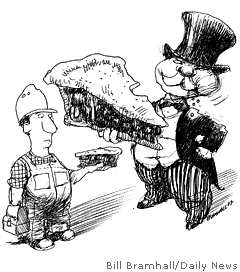Opinion pieces and speeches by EPI staff and associates.
[THIS OP-ED ORIGINALLY APPEARED IN THE NEW YORK DAILY NEWS ON MONDAY, SEPTEMBER 3, 2007.]
Living on the crumbs
While fat cats feast on income gains, working stiffs settle for less of the pie

We give thanks on Thanksgiving and love and chocolate on Valentine’s Day. But if we’re lucky, on Labor Day, we stay as far away from work as we can. We celebrate labor by avoiding it.
Still, as we sip our late-morning coffee, let us spend a few minutes reflecting on what all this work means to us. After all, most of us spend about half our adult, waking hours in the paid labor market—though, if I’m being frank about my own case, there’s about a half-hour period after lunch where I’m not sure “waking” is the right word.
The average middle-income family, combining hours across all workers, spent about 3,100 hours at work last year.
There’s good news and bad news about all that work. Which do you want first? Okay, the good news first. After all, it’s a holiday.
Since the mid-1990s, the American work force has given birth to a surge in what economists call labor productivity, or output per hour worked. That means our manufacturers are more efficiently crafting inputs into the stuff we need and want, while those in our service sector are accomplishing more in an hour than they used to.
Faster productivity growth provides the potential for higher living standards. So reach around and pat yourself on the back, American worker, because, as we economists like to put it, you are a “highly productive labor input.”
But after patting yourself on the back, your hand might have brushed against that wallet in your back pocket and noted it’s feeling a little thin.
And that gets us to the bad news.
We’ve been working harder and smarter, but too many of us don’t have enough to show for it. A report released today by the Economic Policy Institute shows that as of the middle of this year, the hourly wage for the guy right in the middle of the wage scale is up a mere 1%, after inflation, since 2000. Midwage women have done better—up 5%—in part because there’s been a lot more demand for industries where they’re more likely to work, like health care and education. Still, their pay has gone nowhere since 2003.
How is it that the bakers are baking a bigger, better pie but ending up with smaller slices? The answer is inequality. All that faster productivity growth only creates the potential for better living standards. If the gains elude most workers, the potential won’t be realized.
And just this week, we learned that—congratulations!—the New York City area is the poster child for the inequality phenomenon. Income disparities here are the most extreme in the nation, as incomes for the richest fifth of households are 20 times those for the poorest fifth.
Here’s a rule of thumb. If you can easily explain what you do to a 7-year-old (“I’m a cop,” “I’m a teacher,” “I make cars,” “I build houses”), you’re probably not getting your legit share of the productivity pie. If, on the other hand, the kid is lost as you explain how you package loans of dubious quality into financial derivatives, you may have been making a killing—granted, you might also be getting killed right about now, but you had a helluva ride, no?
That is a recipe for an unjust economy. It’s the reason why many of us remain unconvinced when policy elites offer us their cheerleading routine about how great the economy is doing, how “the tax cuts are working, unemployment’s low, GDP is up, yada yada.”
So take a moment this Labor Day and appreciate your productive contribution to our economy. Then start paying close attention to the people who want your vote. If they’re not talking about real ways to get your productivity back into your paycheck, they’re not worth listening to.
Bernstein is a senior economist at the Economic Policy Institute and author of the book “All Together Now: Common Sense for a Fair Economy.”
[ POSTED TO VIEWPOINTS ON SEPTEMBER 4, 2007. ]
